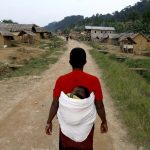For many years, the Democratic Republic of Congo (DRC) has been combatting gender-based violence and particularly sexual violence related to the armed conflicts that have afflicted the country for more than two decades. While political forces and members of civil society have together made strides on this issue in recent years, the emergence of COVID-19 has overshadowed most political, security, and even humanitarian concerns in the DRC.
Following the declaration of a state of emergency on March 24, Congolese federal and provincial authorities have taken measures to respond to the growing threat of COVID-19. For example, the governor of Kinshasa ordered a lockdown of the Gombe municipality, restricted travel between cities with reported cases, ordered the population to wear masks, and banned public gatherings of more than 20 people. However, members of civil society have deemed some of these measures excessive or poorly enforced.
Stakeholders fear an increase in gender-based violence due to authorities ordering school closures, restricting movement, and requiring people to self-isolate in their homes.
In the city of Bukavu in South Kivu, where I work for PHR’s Program on Sexual Violence in Conflict Zones, what we fear above all is not these measures, but rather the ability of our health facilities to care for patients in critical condition, particularly those who require respiratory aids. Very few health facilities have the capacity to offer this type of care and the number of available ICU beds is extremely limited. As a point of reference, the main public hospital in Bukavu shared that they only have 30 available ICU beds for a population of nearly 900,000 residents.
Alongside concerns about COVID-19, the DRC faces a plethora of other persistent public health problems that the pandemic is exacerbating, including sexual and gender-based violence (SGBV). Stakeholders who work on this issue fear an increase in gender-based violence due to authorities ordering school closures, restricting movement, and requiring people to self-isolate in their homes.
Bukavu’s Police Child Protection Unit is already reporting cases of domestic violence in which perpetrators, generally spouses, are acting out under the stress that comes from supporting a household during these challenging economic times. Paradoxically, some health facilities are reporting a decrease in patients, which may be a result of survivors’ fears of being exposed to the virus while seeking treatment. This could also signal that survivors are deciding not to risk infection by seeking psychological support in health facilities. This would be especially disastrous at a time when vulnerabilities are exacerbated and gender-based violence is on the rise.
Particularly concerning is the situation of those who live in rural areas who depend on services offered in nearby cities. Many services – health care included – are not available in rural areas, as they rely on the government resources and humanitarian assistance only available in cities. Without a doubt, restrictions on movement between cities and more remote regions will deprive rural residents of access to health services.
Paradoxically, some health facilities are reporting a decrease in patients, which may be a result of survivors’ fears of being exposed to the virus while seeking treatment.
As in every sector, actors in the fight against sexual violence are trying to mitigate the negative impacts of COVID-19 on their work and ensure the continued availability of services for survivors of sexual violence. Yet, they face major obstacles, such as the difficulty of adapting services to follow new containment measures. Most services offered to survivors require physical contact, which is now often restricted. Moreover, police have been mobilized to enforce social distancing measures, often at the expense of other critical duties such as preventing and combatting sexual violence. In some provinces, populations face additional health and security issues, rendering the fight against sexual violence even more challenging. Adding COVID-19 further complicates a situation which was already precarious.
The Congolese government should integrate an SGBV lens in its response to COVID-19. This is the only way to ensure that survivors continue to receive critical treatment, that those who provide these services can continue to do so in a safe environment, and that we preserve our hard-won gains in the fight to end impunity for crimes of sexual violence.

